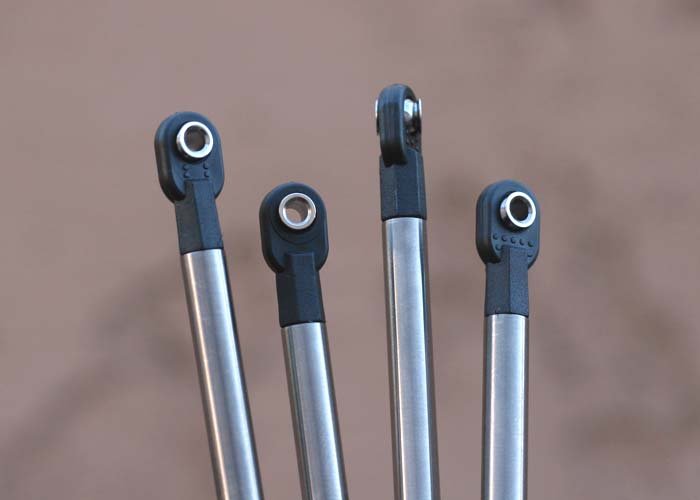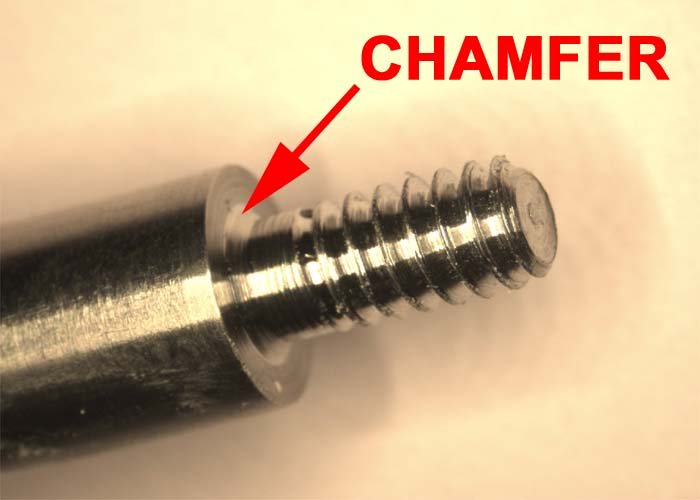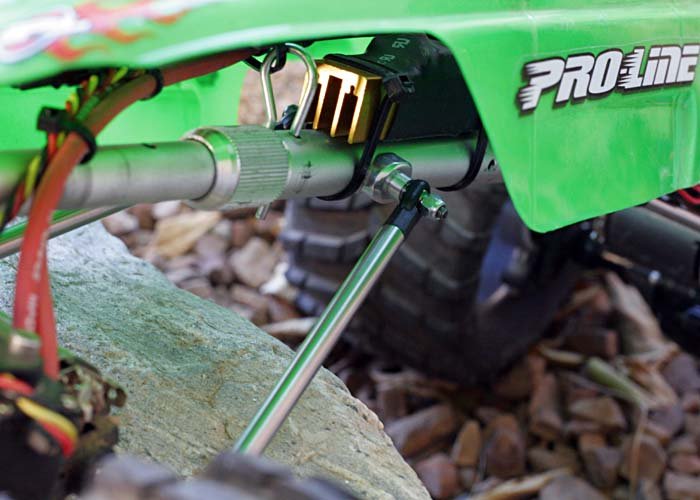roktoy
Dirt Addict
Titanium alloy material is about 40% lighter than steel and about 60% heavier than aluminum, so its combination of weight and strength offers the highest strength-to-weight ratio of any structural metal. It is also highly resistive to corrosion and oxidation.
We ordered up a set of ¼” diameter 6AL-4V titanium alloy (extremely hard) links from Rocksmith Engineering (www. rocksmithengineering.com) to try on our Super class Clod. The titanium has a slight bronze-like hue to it and the machine work on the ends and threads was of high quality. When cutting the thread, Rocksmith also machines a small chamfer between the threaded area and the body of the shaft to further strengthen the threaded end. Set screws or all thread are not needed to attach the rods ends.
The rods were made to our desired length and came ready to install with the Traxxas rod ends we specified. Running our Clod in the rocks showed the links slid well when in contact with rock and they were resistant to scarring.
Rocksmith also sent us a short piece of titanium rod to use to compare to some other solid rod materials we had. We decided to try a couple seat-of-the-pants tests to see how the titanium links compared to aluminum, stainless steel, and Delrin rods.
For our first test we simple drug each rod material across the surface of a rough boulder to get an idea as to how smoothly each slid across the surface. We found the aluminum rod scarred the easiest and seemed to stick on the rock more than the other materials. Our simple, non-scientific method couldn’t detect a major difference in drag between the Delrin, stainless and titanium rods.
Next, we scarred each with a single swipe from the corner of a mill file. We tried to apply an even pressure to each. Results showed the file cut deepest in the softer Delrin, a little less in the aluminum, and the least in the harder stainless and titanium rods.
Finally, we put each in a vise and tried a bend test using a torque wrench and a simple jig for testing. We took a small socket and cross-drilled a ¼” hole in it to accept each of the link rods. With 3 inches of rod sticking out of the vise, we used a torque wrench and the socket to apply 150 in. lbs. of force to the end of each rod. We found that the aluminum bent quite easily. The Delrin bent a good ways and then snapped near the edge of the socket. The stainless rod bent just a bit (.216” diameter), but the titanium (0.243” diameter) showed no significant bending.
What did we conclude?
Any of these materials can be used to make RC crawler links. The Delrin is slippery and tends not to retain a bend under most conditions, but may also be too flexy on heavier rigs. Aluminum is a good all around budget material. For the best in strength and low drag, the stainless or the titanium gets the nod. Finally, the titanium comes out on top with the benefit of the light weight between the two.
We can’t lie to you and say titanium rods are cheap, because they aren’t. But, if you’re looking for a rod the offers super strength, relatively light weight, and good rigidity, then consider titanium. It flat looks cool too.
Rocksmith custom makes titanium suspension and steering links to order. They can make any length you may need and provide various male thread sizes as desired to mate to a variety of rod ends.
We ordered up a set of ¼” diameter 6AL-4V titanium alloy (extremely hard) links from Rocksmith Engineering (www. rocksmithengineering.com) to try on our Super class Clod. The titanium has a slight bronze-like hue to it and the machine work on the ends and threads was of high quality. When cutting the thread, Rocksmith also machines a small chamfer between the threaded area and the body of the shaft to further strengthen the threaded end. Set screws or all thread are not needed to attach the rods ends.
The rods were made to our desired length and came ready to install with the Traxxas rod ends we specified. Running our Clod in the rocks showed the links slid well when in contact with rock and they were resistant to scarring.
Rocksmith also sent us a short piece of titanium rod to use to compare to some other solid rod materials we had. We decided to try a couple seat-of-the-pants tests to see how the titanium links compared to aluminum, stainless steel, and Delrin rods.
For our first test we simple drug each rod material across the surface of a rough boulder to get an idea as to how smoothly each slid across the surface. We found the aluminum rod scarred the easiest and seemed to stick on the rock more than the other materials. Our simple, non-scientific method couldn’t detect a major difference in drag between the Delrin, stainless and titanium rods.
Next, we scarred each with a single swipe from the corner of a mill file. We tried to apply an even pressure to each. Results showed the file cut deepest in the softer Delrin, a little less in the aluminum, and the least in the harder stainless and titanium rods.
Finally, we put each in a vise and tried a bend test using a torque wrench and a simple jig for testing. We took a small socket and cross-drilled a ¼” hole in it to accept each of the link rods. With 3 inches of rod sticking out of the vise, we used a torque wrench and the socket to apply 150 in. lbs. of force to the end of each rod. We found that the aluminum bent quite easily. The Delrin bent a good ways and then snapped near the edge of the socket. The stainless rod bent just a bit (.216” diameter), but the titanium (0.243” diameter) showed no significant bending.
What did we conclude?
Any of these materials can be used to make RC crawler links. The Delrin is slippery and tends not to retain a bend under most conditions, but may also be too flexy on heavier rigs. Aluminum is a good all around budget material. For the best in strength and low drag, the stainless or the titanium gets the nod. Finally, the titanium comes out on top with the benefit of the light weight between the two.
We can’t lie to you and say titanium rods are cheap, because they aren’t. But, if you’re looking for a rod the offers super strength, relatively light weight, and good rigidity, then consider titanium. It flat looks cool too.
Rocksmith custom makes titanium suspension and steering links to order. They can make any length you may need and provide various male thread sizes as desired to mate to a variety of rod ends.







